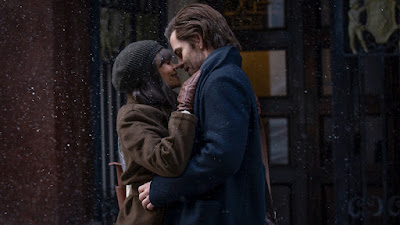Much of “All the Old Knives” is simply the dinner conversation between Henry and Celia, old lovers as well as old co-operatives, meaning the dialogue shifts between teasing out how they still feel about one another and more pointed questions and answers about what transpired during the hijacking op. There are other moments sprinkled in too, like Henry offering of the newly pescatarian Celia a bite of his free-range bacon, a not-quite-as-potent-as-it-needs-to-be metaphor for temptation. That romantic dilemma suffers in part from Celia’s hardly sketched marriage and family, blunting the would-be will they/won’t they tension. The flashbacks, meanwhile, to Henry’s other interrogation of their co-worker and Celia’s mentor Bill Compton (Jonathan Pryce) suffers because of Pryce’s performance, leaning too eagerly into jittery tells, like he’s too excited about playing the murderer in some murder mystery role-playing game. True, his character is a red herring in more ways than one, but he is nevertheless too obviously a feint, and subsequently plays against the notion that Celia ever considered him a mentor in the first place or “like a father.” This guy?
Though Metz conveys the scenes aboard the airplane with more of a handheld approach, and even incorporates Celia’s recurring nightmare about being aboard the hijacked aircraft, the terror of these scenes and the terrorists’ motivations tend to feel distant. That’s not a bad thing. When Henry’s supervisor (Laurence Fishburne) orders he and his other colleagues to contact their sources in the wake of the flight being taken hostage, Henry reaches out to an old Chechen informant (Orli Shuka) the CIA forced him to sell out to Russia. There’s convenience in the plotting here, perhaps, an international incident coming down to a pair of old friends, but it also speaks to how Americans and American intelligence spur radicalization that comes back to haunt them while simultaneously seeking to wipe their hands of it. In this light, the coldness of the hijacking scenes feels true, less real life than a geopolitical problem to solve.
That lack of feeling trickles down to the all-important romantic relationship. In the present-day scenes, Pine and Newton’s chemistry is more icy than titillating, the two actors consciously playing, like, you know, CIA agents, cautious of their every move, sending up looks and seemingly banal observations as feelers, trying not to betray too much, especially since they both know why Henry is here even if he is not explicitly saying it. In the past scenes, however, where their passion is supposed to be both paramount and genuine, the two actors still seem stuck in their present-day gear, the romantic passion oddly muted. Even if the placement of a mid-movie sex scene is spot-on, staged in the wake of the hijacking going wrong, this being their reaction to it, the whole thing is played and shot in such an artful way that it ironically undercuts any sense of the ostensible urgent release. Their love and their lust, in other words, feels like a put-on when it’s the single element of the movie that is not supposed to be a put-on at all, meaning the movie’s biggest twist, not to be revealed, which could have been scorching, pitting desire and duty square against each other in the center ring, fatally falls flat.





No comments:
Post a Comment